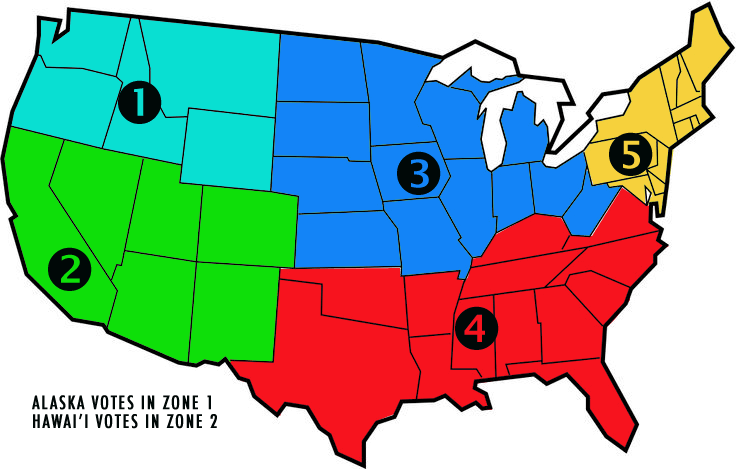Ricochet is the best place on the internet to discuss the issues of the day, either through commenting on posts or writing your own for our active and dynamic community in a fully moderated environment. In addition, the Ricochet Audio Network offers over 50 original podcasts with new episodes released every day.
 Fixing Our Primaries’ Hot Mess
Fixing Our Primaries’ Hot Mess

The designer of the US Presidential Primary System is being transported to the Home for Retired Masochists
If a camel is a horse designed by a committee, our system of primaries and caucuses are a method of selecting candidates designed by a bipolar orangutan with a masochistic streak.
Somewhere along the line, New Hampshire’s claim on being the first primary of the season become sacrosanct. Why? You could stick 28 New Hampshires into Texas and still have enough space to cram in a couple of Delawares. The Hawkeye Cauci? Corn, and cows, and sideways coin flips? That’s enough to knock candidates out of the race? It’s ludicrous.
 If you google the terms “Reforming the Primaries” you mainly get a litany of liberal fixes. And I mean that in the same way that the vet “fixed” Fido. Only here, the emasculation is aimed directly at the Republican Party. Among their pet “reforms” are same-day registering with no required identification and completely open primaries. In states such as California, they’ve found this to be very effective in making sure no one is ever faced with the possibility of accidentally voting for a Republican. It makes the voting booth the equivalent of a college safe place. We wouldn’t want anybody faced with the microaggression of seeing an “R” on their ballot.
If you google the terms “Reforming the Primaries” you mainly get a litany of liberal fixes. And I mean that in the same way that the vet “fixed” Fido. Only here, the emasculation is aimed directly at the Republican Party. Among their pet “reforms” are same-day registering with no required identification and completely open primaries. In states such as California, they’ve found this to be very effective in making sure no one is ever faced with the possibility of accidentally voting for a Republican. It makes the voting booth the equivalent of a college safe place. We wouldn’t want anybody faced with the microaggression of seeing an “R” on their ballot.
Moving elections to the weekends is another liberal pet project, apparently because Tuesdays are too burdensome. I don’t understand that. In most states, polls are open from 12 to 13 hours. Take away an eight-hour work day and there’s still four to five hours left to do your 15 minutes of civic duty. That is, unless The International Communist and Socialist Committee for The Destruction of the Individual and the Promotion of Free Monthly Underwear can only get the back room of the pizza parlor on the first Tuesday of every month. I mean those meetings last for frickin’ hours.
Another solution is declaring election days paid holidays. At the right time of the year, that only assures that — instead of not voting from home — people will not vote from the lake.
As for proposals to make voting mandatory, well, nothing says “freedom” like compulsory action under penalty from an authoritarian state.
All of this is nonsense, of course, and would require some sort of Congressional action. And not just legislation, but legislation that could be defended in the courts. Both the DNC and RNC could rightly claim the federal government had no compelling interest in telling them how they run the pure party function of selecting candidates.
Any reform would need to come from the parties themselves. To help Reince and company, I offer The Hill Plan:
 Break the country into five regions — with states in each to hold primaries on the same day — and reduce the primary season to the months of March, April, and May. In the first election after its adoption, the order would be chosen by lottery; after that, by the highest percentages of voter participation in the previous primary season.
Break the country into five regions — with states in each to hold primaries on the same day — and reduce the primary season to the months of March, April, and May. In the first election after its adoption, the order would be chosen by lottery; after that, by the highest percentages of voter participation in the previous primary season.
The first sanctioned debate would be held on Lincoln’s birthday and the first regional primary on the first Tuesday in March, with each subsequent primary taking place every two weeks until mid-May. The weeks that no voting occurs are left for scheduling additional debates. All primaries would be closed and delegates would be proportionally chosen.
There. Wasn’t that simple?
Published in General



Except without the proportional representation, right?
Right now, the GOP, as a non-governmental entity, has the right to choose its candidate. Is there a law that says there must be a primary, and that the primary winner must be the candidate?
The 1237 Rule isn’t a law, for example, and it’s not even a tradition, just the rule that happens to be in operation at the moment, and may be nullified by the rules committee before or during the convention. Given that, and given that (arguably, at least) the Trump campaign has demonstrated that a demagogue with no governing experience, little relevant education (not even of the auto-didactical variety)and only a recent and tenuous commitment to the principles that define the party can nonetheless lay claim to its leadership… it seems to me that it makes sense to declare outright what everyone has been saying is the underlying reality anyway; there is a GOP establishment, and the GOP establishment is—and should be—in control of who is selected to be the GOP candidate.
If Donald Trump (or anyone else) can’t persuade the GOP that he’s the guy they want, he could go out, collect some impressive number of citizen signatures (perhaps 5000 from each of the fifty states?), get on the ballot and run as an independent. Or start his own party.
Now I feel sad for the orangutan in the picture. I guess those folks are helping him, not hurting him, but he looks really scared.
To cleanse the palate, here’s a happy and content orang:
There. Now I feel better.
Thank you, Matt. The unhappy Oran was making me sad, too.
It’s too bad that they could not have figured out a way to get this to happen up front. The truth is that they were afraid he’d run third-party and were confident that a real Republican could beat him in the Republican primary. Now they’re left with a lot of, “if only . . .” It’s not that I blame them. Who could have honestly guessed we’d end up where we are? I do blame Mike Murphy, however.
For those advocating the “free market” approach, that’s pretty much what’s got us here and has created such stellar candidates.
Well, yes and no. It’s open primaries mostly that have gotten us to this point. Caucuses and closed primaries have been a lot better.
In fairness to the various state parties, this is the first year in decades for most that their primary vote has mattered. I’m willing to bet that each state party sits down some time next December and says, “How can we make sure this never happens again?” For all I know, a lot of them are already reworking their processes for the next election. And I’m convinced that the response in most states will be closed caucuses.
I tend to disagree. There have been several episodes of interference in the process by both governments and the national parties, which can easily be blamed for any current “disfunction”.
I thought I had an article saved in my bookmarks that did a good job of illustrating how previous attempts at centralized “simplification” have screwed with the process and that the trend over time has been to take influence away from the state level. I would have linked to it, but I can’t seem to find it at present. Apologies. (I really gotta start using Evernote for this stuff.)
Or, they may be sitting down to say, “how can we make sure our primary vote continues to matter?”
Fair enough. I wrote that badly.
They are probably sitting down to say, “if our primary matters again, how can we make sure that it is designed to pick a candidate that the actual party actually supports?”
That might work in a pre-Lois Lerner era. No one who’s been paying attention trusts the bureaucracy to keep our information confidential anymore.
Some of us have names that are sufficiently unusual that this would not protect us anyway.
That’s debateable. It depends on the personalities involved. Are the state party’s decision-makers more interested in preserving their state’s “actual” Republican influence compared to “not previously” Republicans, or are they more interested in increasing their state’s influence compared to other states, even if it’s at the expense of “actual” Republicans?
I’ve read quite a bit here expressing the opinion that Trump was not conservative and is not suitable as the presidential candidate for the Republican party.
We need to reduce the power in Washington. Pass a law: 10 years after taking the oath of office for the first time, the president is encased in concrete and put on Mt Rushmore. They call it public service.
Well, speaking as the wife of a very active state party volunteer, the member of our state party with whom I am most closely acquainted is much more interested in preserving our state’s “actual” Republican influence. This is because he is interested in influencing the direction of the country in favor of policies favored by “actual” Republicans. And this is because he thinks that those policies will actually, if enacted, be good for the whole country. And he spends one heck of a lot of time working with other members of our state party, and believes that most of them feel approximately the same way.
I’m going to take a contrarian view here in that the current Byzantine process is actually a good thing. Being President is a very complex job, that doesn’t lend itself well to a formulaic if x then y approach. Demonstrating successful navigation and mastery of a very complicated election process shows to me the capability of the candidate to handle higher order thinking and non-trivial problem solving.
As for improvements to the current process, Majestyk has a good one for ordering the vote relative to republican support. Seems to me it would need to be weighted according to electoral college votes (i.e. Texas should carry more weight than Utah, even though Utah has a higher percentage of republican voters), but a great idea nonetheless. Anything to break the Iowa/NH stranglehold.
Hmm. As much as it might be nice to give the extra weight to the most Republican states, it might make most sense from a practical point of view to give the most weight to the swing states. If you give the most weight to Texas and Utah, you run the risk of finding a candidate too far right to appeal to the middle. And isn’t the goal to find a candidate we can actually elect to the presidency?
I guess I disagree. My first choice candidates all dropped out before voting even started, which means it is not the fault of the primary system. Would Walker have been able to stay in if TX was the first primary? He dropped out months before any caucus or primary.
The free market approach has resulted in chaos. States jockeying to have influence by constantly moving their primary dates, some doing caucuses, some doing primaries, changing rules to try to help favorite sons… It’s a mess.
Throw out Ronald Reagan and Barack Obama (and for vastly different reasons) but since 1968 what truly stellar candidate has this system produced on either side?
You’re just noticing more this year because it’s been an excremental extravaganza on both sides.
We all adore federalism. But the presidency is not a state office. It should not be for Iowa, New Hampshire or South Carolina to decide for the rest of us.
And yet, there was arguably more of a free market approach prior to 1968.
(Emphasis mine.)
https://en.wikipedia.org/wiki/United_States_presidential_primary#History
Even very ordinary names are denied access to airplanes. Sorry Mr. Todd, you get to walk.
I read this and agreed but would note that we’ve managed to get Dole, McCain, and Romney, none of whom was very far to the right and none of whom won the presidency.
Since this cycle finds us twisting in the wind with a businessman and a man considered to be ultra-conservative, (and the risk that the ‘Party’ will pick another candidate for us in a display of contempt for roughly 60-percent of the Republicans and Republican-leaning voters), we have a chance to discover if either a business background or ultra-conservatism is appealing to the masses. Or if the oracles at the GOPe level have discovered a magic pill that would cause us to want to vote for – as opposed to against – someone.
Voting against someone, commonplace. Voting for someone. A novelty.
No surprises now. I’ll vote for either of them as both are preferable to the progressive candidates for the same post. And, I do vote.
A tweak on the original idea: One state from each region to hold its primary on each voting day, the order within the region to be determined by percentage of party votes in the last national election.
That makes sure all regions have some impact in the winnowing process, rewards state parties that turn out voters, and also rewards candidates who build a national organization, rather than cherry-picking early or favorable states.
Priebus should concentrate on fixing one thing the RNC can directly control: the primary debates.
Hire the hall, stream it on C-Span. Get rid of the media hacks who mainly want to insert themselves into the debate. Have the candidates debate questions like “My Foreign Policy Is Best Because” 5 minute statement, 3 minutes to rebut the other candidates, 1 minute summary.
Too many candidates for the stage, divide into two groups, draw lots for who gets to be in which one.
Just some ideas to ramp back the disgraceful clown show we’ve seen the past 3 election cycles.
Nick, I think you have a handle on the right idea, but I’d consider having smaller debates between two of the contestants. Give each of them 10 minutes to respond to an idea or a consideration in a series of questions in a particular area such as fiscal issues or foreign policy.
I don’t know about polling to try and figure out who won. No idea truthfully. If someone has a following and that following wants to stuff a ballot box using differing names or identifiers how would one know?
So, alternate the contestants against other peers for the job. If the material is recorded and available on youtube or somewhere else where the content cannot be modified, people can log on and watch and listen and form their own opinions. Who thinks right? Who can think on his or her feet? Who responds with canned answers? Who responds with bluster? Based on your own observations, who do you trust?
I would be happy if states decided to dump caucuses and early voting. Give people lots of time to vote, Saturday is fine or a holiday voting week day works. I live in a caucus state (Utah) and it is designed to reduce voting and control outcome. Delegates are all party insiders and they have little interest in hearing from voters. I am fine with open primaries too.